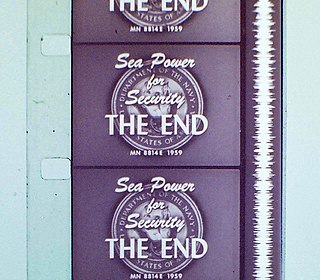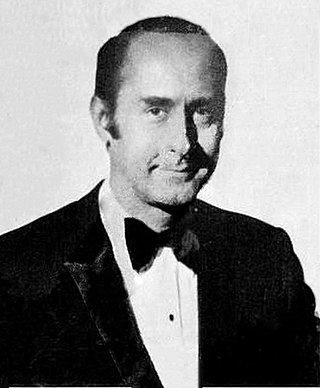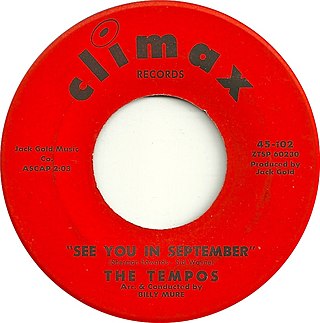A happening is a performance, event or situation meant to be considered art.
Contents
Happening, Happenings, or The Happening may also refer to:
A happening is a performance, event or situation meant to be considered art.
Happening, Happenings, or The Happening may also refer to:
A fugitive is a person fleeing from arrest.

A soundtrack is recorded sound accompanying and synchronised to the images of a book, drama, motion picture, radio program, television program, or video game; colloquially, a commercially released soundtrack album of music as featured in the soundtrack of a film, video, or television presentation; or the physical area of a film that contains the synchronised recorded sound.

Henry Mancini was an Italian-American composer, conductor, arranger, pianist and flutist. Often cited as one of the greatest composers in the history of film, he won four Academy Awards, a Golden Globe, and twenty Grammy Awards, plus a posthumous Grammy Lifetime Achievement Award in 1995.

Alan Price is an English musician who first found prominence as the original keyboardist of the English rock band the Animals. He left the band in 1965 to form the Alan Price Set; his hit singles with and without the group include "Simon Smith and the Amazing Dancing Bear", "The House That Jack Built", "Rosetta" and "Jarrow Song". Price is also known for work in film and television, taking occasional acting roles and composing the soundtrack of Lindsay Anderson's film O Lucky Man! (1973). He was inducted into the Rock and Roll Hall of Fame in 1994 as a member of the Animals.

American singer-songwriter Bob Dylan has released 40 studio albums, 102 singles, 24 notable extended plays, 61 music videos, 16 live albums, 17 volumes comprising The Bootleg Series, 31 compilation albums, 25 box sets, seven soundtracks as main contributor, seventeen music home videos and two non-music home videos. Dylan has been the subject of eleven documentaries, starred in three theatrical films, appeared in an additional thirty-six films, documentaries and home videos, and is the subject of the semi-biographical tribute film I'm Not There. He has written and published lyrics, artwork and memoirs in 11 books and three of his songs have been made into children's books. He has done numerous collaborations, appearances and tribute albums. The albums Planet Waves and Before the Flood were initially released on Asylum Records; reissues of those two and all others were on Columbia Records.

Jennifer Vashti Bunyan is an English singer-songwriter. She began her career in the mid-1960s and released a debut album, Just Another Diamond Day, in 1970. The album sold very few copies and Bunyan, discouraged, abandoned her musical career. By 2000, her album had acquired a cult following; it was re-released and Bunyan recorded more songs, initiating the second phase of her musical career after a gap of thirty years. She released two more albums, Lookaftering in 2005, and Heartleap in 2014.

Easy Rider is the soundtrack to the cult classic 1969 film Easy Rider. The songs that make up the soundtrack were carefully selected to form a "musical commentary" within the film. The album of the soundtrack was released by ABC-Dunhill Records in August 1969. It peaked at #6 on the Billboard album charts in September of that year, and was certified gold in January 1970.

Jim Pons is an American bassist, author, singer, and video director who most notably played for the Leaves (1964–1967), the Turtles (1967–1970), and the Mothers of Invention (1970–1971) and Flo and Eddie (1971-1973).
A soundtrack album is any album that incorporates music directly recorded from the soundtrack of a particular feature film or television show. The first such album to be commercially released was Walt Disney's Snow White and the Seven Dwarfs, the soundtrack to the film of the same name, in 1938. The first soundtrack album of a film's orchestral score was that for Alexander Korda's 1942 film Rudyard Kipling's Jungle Book, composed by Miklós Rózsa.

"Happenings Ten Years Time Ago" is a song by the English rock group the Yardbirds. Written and recorded in 1966, it is considered one of their most progressive works. The song was the group's first to feature the dual-lead guitar line-up of Jeff Beck and Jimmy Page. The two contribute an array of guitar parts during the instrumental sections, described as "a full-on six-string apocalypse". Lyrically, it deals with notions of past life and déjà vu.

Yellow Submarine is the tenth studio album by the English rock band the Beatles, released in January 1969. It is the soundtrack to the animated film of the same name, which premiered in London in July 1968. The album contains six songs by the Beatles, including four new songs and the previously released "Yellow Submarine" and "All You Need Is Love". The remainder of the album is a re-recording of selections from the film's orchestral soundtrack by the band's producer, George Martin.
In Cold Blood is a 1966 book by Truman Capote.

"Secret Agent Man" is a song written by P. F. Sloan and Steve Barri. The most famous recording of the song was made by Johnny Rivers for the opening titles of the American broadcast of the British spy series Danger Man, which aired in the U.S. as Secret Agent from 1964 to 1966. Rivers's version peaked at #3 on the Billboard Hot 100 and #4 on the Canadian RPM chart, one of the biggest hits of his career. Numerous covers and adaptations have been recorded since then with the song becoming both a rock standard and one of Johnny Rivers's signature songs.

"Alfie" is a song written by Burt Bacharach and Hal David to promote the 1966 film Alfie. The song was a major hit for Cilla Black (UK) and Dionne Warwick (US).

"The Look of Love" is a popular song composed by Burt Bacharach and Hal David and originally popularized by English pop singer Dusty Springfield. The song is notable for its sensuality and its relaxed bossa nova rhythm. The song was featured in an extended slow-motion interlude to the 1967 spoof James Bond film Casino Royale. In 2008, the song was inducted into the Grammy Hall of Fame. It also received a Best Song nomination at the 1968 Academy Awards. The song partially inspired the film Austin Powers: International Man of Mystery (1997).
Riding High may refer to:

"See You in September" is a song written by Sid Wayne and Sherman Edwards. It was first recorded by the Pittsburgh vocal group the Tempos. This first version peaked at No. 23 in the USA in the summer of 1959, and No. 16 in Canada. The most popular take on "See You In September" was by the Happenings in 1966, which reached No. 3.

The soundtrack of the film The Sound of Music, music and lyrics by Rodgers and Hammerstein, was released in 1965 by RCA Victor and is one of the most successful soundtrack albums in history, having sold more than 20 million copies worldwide. The soundtrack has been issued in German, Italian, Spanish and French.

Funny Lady is the soundtrack album of the 1975 musical film of the same title, starring Barbra Streisand. Released by Arista Records on March 15, 1975, arranged, conducted, and coordinated by Peter Matz, the album's fifteen tracks are performed by Streisand, James Caan, and Ben Vereen. A sequel to the 1968 musical comedy-drama Funny Girl, the songs extend the semi-biographical account of the life of American performer Fanny Brice. Funny Lady also included songs written by Brice's third husband Billy Rose. New music by Kander and Ebb included "How Lucky Can You Get", the album's only single, released in April 1975.

"On a Clear Day (You Can See Forever)" is a song written by Burton Lane (music) and Alan Jay Lerner (lyrics) for the 1965 Broadway musical On a Clear Day You Can See Forever. It was subsequently performed by American actress and vocalist Barbra Streisand in the 1970 film adaptation of the musical.